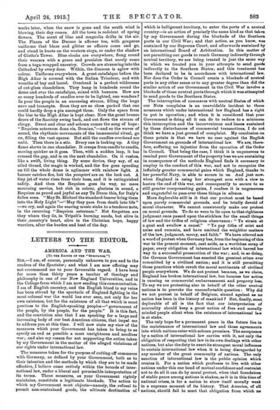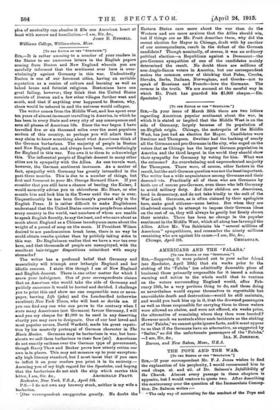LETTERS TO THE EDITOR.
AMERICA AND THE WAR.
LTD fn. EDIT. Or an ..SrscrATos..1 am, of course, personally unknown to you and to the readers of the Spectator; and what I am now offering may not recommend me to your favourable regard. I have been for more than thirty years a teacher of theology and philosophy in one of our New England Universities, and in the College from which I am now sending this communication. I am of English ancestry, and the English blood in my veins has been stirred by the spectacle of England fighting in the most colossal war the world has ever seen, not only for her own existence, but for the existence of all that which is most precious to the English-speaking peoples—" government of the people, by the people, for the people." It is this fact, and the conviction also that I am speaking for a large and increasing body of our best American citizens, that impel use to address you at this time. I will now state my view of the measures which your Government has taken to bring to as speedy an end as possible a moat unrighteous and needless war; and also my reason for not supporting the action taken by my Government in the matter of the alleged violations of our rights under international law.
The measures taken for the purpose of cutting off commerce with Germany, as defined by your Government, both as to their intention and the methods by which they are to be made effective, I believe come entirely within the bounds of inter- national law, under a liberal and permissible interpretation of its terms. These measures, as your Government rightly maintains, constitute a legitimate blockade, The action to which my Government most objeots—namely, the refusal to permit non-contraband goods, the ultimate destination of which is belligerent territory, to enter the ports of a neutral country—is an action of precisely the same kind as that taken by my Government during the blockade of the Southern ports in our Civil War; and that action, as you know, was sustained by our Supreme Court, and afterwards sustained by an international Board of Arbitration. In this matter of not permitting our goods to reach Germany indirectly through neutral territory, we are being treated in just the same way in which we treated you in your attempts to send goods indirectly to the Southern States; and this treatment has been declared to be in accordance with international law. Nor does the Order in Council create a blockade of neutral ports in any other sense or to any greater degree than did the similar action of our Government in the Civil War involve a blockade of those neutral ports through which it was attempted to send goods to the Southern Stales. The interruption of commerce with neutral States of which our Note complains is an unavoidable incident to those measures which under international law England has a right to put in operation; and when it is considered that your Government ie doing all it can do to reduce to a minimum this interruption and the inconvenience and losses sustained by these disturbances of commercial transactions, I do not think we have a just ground of complaint. My conclusion on these points is that we have no case against the English Government on grounds of international law. We are, there- fore, suffering no injustice from the operation of the Order in Council. That being the case, I think it is ungenerous to remind your Government of the property loss we are sustaining in consequence of the methods England finds it necessary to employ in the conduct of this war, and not to recognize the infinitely greater commercial gains which England, thanks to her powerful Navy, is able to secure to us. And just now, when England is using her strongest arm with a view to hasten the end of this war, and consequently to secure to us still greater compensating gains, I confess it is ungenerous and ungrateful to pass over these things in silence. More deplorable still is it that our protest most be based upon purely commercial grounds, and be totally devoid of moral character. We cannot consistently make our protest on moral grounds. To do so were to lie open to that righteous judgment once passed upon the sticklers for the small things of law and the trifles of religious observance " Ye strain at a gnat and swallow a cameL" "Ye pay tithe of mist and anise and ournmin, and have omitted the weightier matters of the law, judgment, mercy, and faith." We have uttered not a word of protest when Germany has, from the beginning of this war to the present moment, cad aside, as a worthless scrap of paper, every obligation of international law which barred her way to a successful prosecution of the war; and, in so doing, the German Government has enacted the greatest crime ever committed by a civilized nation; and it is still permitting those practices which revolt the moral sentiments of civilized people everywhere. We do not protest because, as we claim, England has broken international law, but because her action is causing us commercial embarrassment and property loss To say we are protesting also in behalf of the other neutral
nations is to provoke the uncomfortable question: Why did
we not protest in behalf of Belgium, sinned against as no nation has been in the history of mankind P But, finally, most deplorable of all is the fact that our interpretation of neutrality should keep a great nation of free and morally minded people silent when the existence of international law is at stake.
The only hope for a permanent peace in the future lies in the maintenance of international law and those agreement* into which nations enter with solemn promises. The acceptance
by a nation of international law carries with it, not only the obligation of respecting that law in its own dealings with other nations, but also the duty to exert its strongest moral influence to sustain international law when it is being disregarded by any member of the great community of nations. The only
sanction of international law is the public opinion which
creates it. For a nation which protegees to live with other nations under this one bond of mutual confidence and restraint
not to do all it can do by moral protest, when that foundation
of stable peace among nations is shaken, as it is in this time of national crises, is for a nation to show itself morally weak
in a supreme moment of its history. That America, of all nations, 'should fail to most that obligation from which no plea of neutrality can absolve it fills one American heart at /east with sorrow and humiliation.—I am, Sir, &a.,
JOHN E. RUSSELL.
Williams College, Williamstown, Mass.















































 Previous page
Previous page